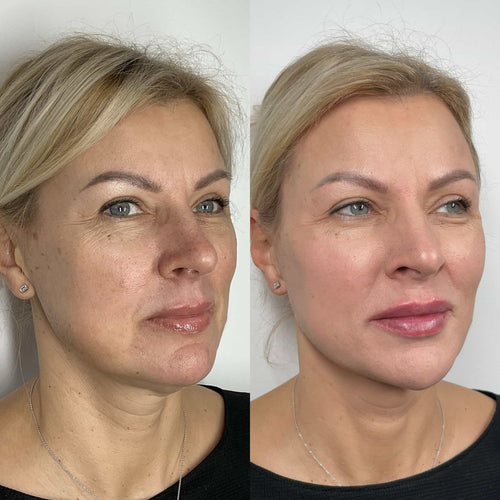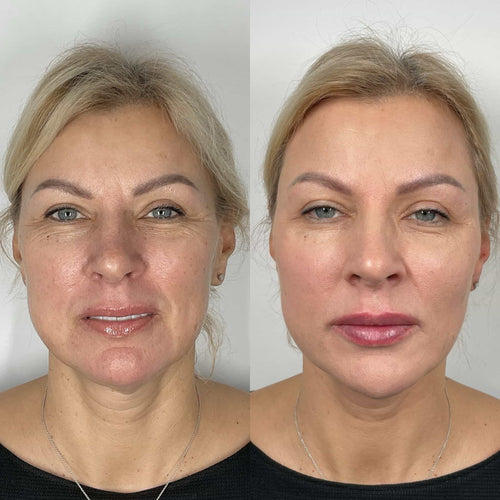Schedule a Dermal Filler Consultation with Dr. Laura Geige Now
Pre-Injection Preparation
Choosing Your Practitioner
Pre-injection preparation is crucial for minimizing swelling and ensuring optimal results from lip filler injections.
Begin by avoiding certain medications, such as *blood thinners* and *aspirin*, a week before your appointment as they can increase bruising and bleeding.
On the day of your treatment, refrain from consuming alcohol and caffeinated beverages, which can also contribute to swelling.
Arrive at your appointment well-hydrated by drinking plenty of water throughout the day.
Choosing the right practitioner is paramount for achieving natural-looking results and minimizing complications.
Seek out a board-certified dermatologist, plastic surgeon, or licensed medical injector with extensive experience in lip augmentation.
Look at *before-and-after* photos of their previous patients to gauge their aesthetic style and skill level.

Ensure the practitioner uses high-quality, FDA-approved fillers from reputable brands.
Schedule a consultation to discuss your desired outcomes, concerns, and medical history. This allows you to ask questions and assess if the practitioner is a good fit for you.
Don’t hesitate to seek multiple consultations to compare different practitioners before making your decision.
Minimizing Allergic Reactions
Preparing for lip filler injections involves several steps that can help minimize swelling and allergic reactions.

Pre-Injection Preparation:
• **Consultation:** Before your appointment, schedule a consultation with a qualified and experienced injector. Discuss your desired outcome, medical history, and any allergies or concerns you may have.
• **Medical History Review:** The injector will review your medical history, including medications, supplements, and previous cosmetic procedures. Be honest and transparent about all relevant information.
• Allergy Testing:** If you have a history of allergies or are concerned about an allergic reaction, allergy testing may be recommended. This can help identify potential sensitivities to the filler material.
• **Lifestyle Modifications:** In the days leading up to your appointment, avoid blood-thinning medications such as aspirin or ibuprofen, as they can increase bruising and swelling.
• Hydration:** Drink plenty of water in the days before and after your injections. Proper hydration can help reduce inflammation and promote healing.
• **Avoid Alcohol and Caffeine:
Alcohol and caffeine can dehydrate you and make swelling worse.
Minimizing Allergic Reactions:
• **Cross-Reactivity:** Be aware of potential cross-reactivity. If you have allergies to certain types of fillers, you may be more susceptible to reactions to others.
• Filler Material Selection:** The injector will choose a filler material that is suitable for your skin type and minimize the risk of allergic reactions. Hyaluronic acid-based fillers are generally considered safe and well-tolerated.
• **Patch Testing: A patch test can be performed to assess your individual sensitivity to the filler material.
• Administering Antihistamines: ** The injector may prescribe or recommend taking antihistamines before and after the injections to help prevent allergic reactions.
• **Immediate Post-Injection Care:** Apply a cold compress to the injected area to reduce swelling. Follow your injector’s instructions carefully for post-injection care, including avoiding strenuous activity and sun exposure.
Immediate Post-Injection Care
Ice, Ice Baby!
Immediate post-injection care is crucial for minimizing swelling and ensuring optimal results after lip filler treatment.
Here are some essential tips to follow:
-
Avoid touching or rubbing your lips.
-
Refrain from drinking through a straw for at least 24 hours, as this can disturb the filler placement and increase swelling.
-
Stay hydrated by drinking plenty of water.
-
Do not engage in strenuous activities or exercise for at least 24-48 hours.
-
Sleep with your head elevated to reduce fluid accumulation.
Applying ice packs strategically is a highly effective method to minimize swelling after lip filler injections:
-
Immediately after the procedure, apply an ice pack wrapped in a thin towel to your lips for 10-15 minutes at a time.
-
Repeat this process every 2-3 hours for the first 24 hours.
-
Avoid direct contact between the ice and your skin, as this can cause damage.
By diligently following these immediate post-injection care instructions, you can significantly reduce swelling, promote healing, and achieve the desired results from your lip filler treatment.
Elevation is Key
Immediately after receiving lip fillers, it’s crucial to prioritize minimizing swelling and promoting proper healing.
Elevation is a key component of post-injection care that can significantly reduce puffiness.
Here’s how elevation works its magic:
-
Gravity’s Role: Swelling occurs when fluids leak from the injected area, causing tissues to expand. When you lie down with your head elevated, gravity helps counteract this fluid buildup, directing it away from the lips and reducing swelling.
-
Improved Circulation: Elevation can also improve blood flow in the treated area. Enhanced circulation assists in removing waste products and excess fluids, contributing to faster healing and reduced inflammation.
How to Elevate Effectively:
-
Position Yourself: After your procedure, prop yourself up with extra pillows. Your head should be slightly higher than your heart for optimal results.
-
Stay Elevated for Several Hours: Continue elevating your head for at least 2-3 hours after your appointment. You can gradually decrease the elevation as swelling subsides.
Remember, consistent elevation during the initial post-injection period is crucial for minimizing swelling and maximizing your lip filler results.
Long-Term Management
Gentle Touch Policy
Long-term management after lip filler treatment involves a combination of proper post-treatment care and understanding how to maintain the results over time.
Gentle Touch Policy:
This refers to a careful approach when handling the treated area, especially during the initial healing phase.
Minimizing Direct Pressure and Rubbing
Avoid pressing or rubbing the lips excessively as this can dislodge the filler particles and lead to uneven distribution or bruising.
Touching with Clean Hands
If you need to touch your lips, ensure your hands are thoroughly cleaned to minimize the risk of infection.
Hydration is Key
Drinking plenty of water helps keep the skin hydrated and promotes optimal healing.
Avoiding Heat or Extreme Temperatures
Steaming, hot tubs, saunas, and very cold temperatures can affect the filler’s longevity and potentially cause swelling.
Protecting from Sun Exposure
The sun’s UV rays can break down collagen and hyaluronic acid (the main component of many fillers), leading to faster fading of results. Always use a broad-spectrum sunscreen with an SPF of 30 or higher on your lips.
Follow Your Provider’s Instructions
Each provider may have specific recommendations for post-treatment care. Adhering to their guidelines is crucial for optimal healing and results.
Hydration Nation
Long-term management of swelling after lip filler injections involves a multi-faceted approach that prioritizes both immediate and ongoing care.
Hydration plays a crucial role in minimizing swelling and promoting healing.
-
Drink plenty of water throughout the day to keep your body hydrated from within.
-
Avoid excessive caffeine and alcohol, as they can dehydrate the body and worsen swelling.
Arrange a Consultation for Dermal Fillers with Dr. Laura Geige
Cold Compresses can help constrict blood vessels, reducing inflammation and puffiness.
Apply a cold compress to the treated area for 10-15 minutes at a time, several times a day, especially during the first 24-48 hours after injection.
**Gentle Massaging** can improve circulation and help distribute filler evenly, reducing the appearance of lumps or bumps.
Starting a few days after treatment, gently massage the treated area with clean hands in circular motions for a few minutes at a time.
Book a Dermal Filler Consultation with Dr. Laura Geige at It’s Me and You Clinic
Elevation** is another effective strategy to minimize swelling.
Keep your head elevated while sleeping and during periods of rest. This helps reduce fluid buildup in the face.
**Over-the-Counter Medications** such as ibuprofen or arnica can help manage inflammation and discomfort.
Avoid Certain Activities that can increase swelling, such as strenuous exercise, saunas, or hot tubs, for at least a few days after treatment.
Follow Your Provider’s Instructions:**
It is essential to strictly follow your provider’s post-treatment instructions regarding medication, skincare, and activities. They will provide personalized advice based on your individual needs.
Kahh Spence Beauty Live Your Vows Josie Barrett Hopeless Book Classy Pleasure
- Traptox Aka Trapezius Botox Treatment Near Busbridge, Surrey - January 7, 2025
- Will Lip Filler Hide Smokers Lines? - December 23, 2024
- Boyfriend Won’t Go Down On You? Here’s What To Do - December 23, 2024

